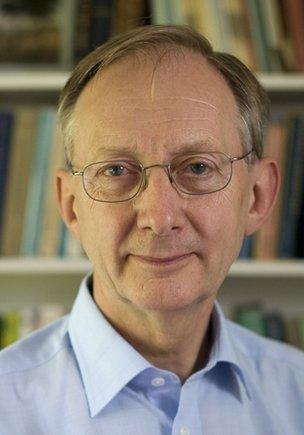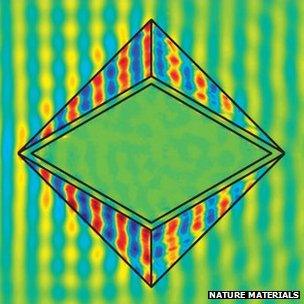'Invisibility cloak' pioneer John Pendry scoops Newton Medal
- Published

Prof Pendry said it was "a great honour" to receive the Isaac Newton Medal
The physicist who proposed the idea of an "invisibility cloak" has received the Newton Medal, the highest honour of the UK's Institute of Physics (IoP).
Imperial College London's Prof Sir John Pendry was cited "for his seminal contributions to surface science, disordered systems and photonics".
But his work on cloaking and "metamaterials" is arguably his most famous and potentially transformative.
IoP president Peter Knight called the award "our most important medal".
The institute announced a raft of other awards and honorary fellowships, external on Monday.
Prof Pendry first gained notoriety outside the field of physics when he published an idea for an "invisibility cloak", external in 2006.
The concept made use of metamaterials - whose properties are not defined by their chemical makeup but rather by their structure on the tiniest scales - to guide light around an object, rendering it in effect invisible.
"The whole set of ideas was inspired by something very practical - it came about because I was consulting for the Marconi company on some very mundane material they used to absorb radar, which worked very well but they didn't know how it worked," Prof Pendry told BBC News.
"Coming to understand that and to explain that led me to a whole new area of research."
Since then, the field has burgeoned, and the ideas laid out in that first paper have spread to many more applications, ranging from acoustic cloaking to cloaking buildings from earthquakes.
However, suggestions in the intervening years of an imminent invisibility cloak popularised by the Harry Potter franchise may have been misguided.

Simple ideas have flourished as a whole new field of research looks to capitalise on "invisibility"
"I think it illustrates yet again the unpredictability of research," Prof Pendry said of the proliferation of work on the topic.
"When you have an original idea, if it's a really good one, you don't know where it's going, because it's bigger than you are.
"I had no idea when I started with a few simple notions that it would actually go so far."
Prof Sir Peter Knight, president of the IoP, said he was "delighted" that the award had gone to Prof Pendry.
"The Newton Medal is really the most important we have at the IoP, and it's to recognise real distinction in physics," he told BBC News.
"My personal view is that what John Pendry has done with his work on metamaterials, on perfect lensing, on cloaking - that work is the most exciting that I've seen in optics in a generation."
But he added that the award was for a far broader body of work in theoretical physics - from the theory of surfaces to how electrons bounce off of messy, "disordered systems".
"John is an incredibly brave character who usually has a decade of activity and then moves on," Prof Knight said.
"What he's done is taken a deep breath every decade and said, 'OK, done that, enjoyed that, where are the big issues somewhere else that I can make a big impact on?'"
The Newton medal and prize of £1,000 will be presented at a ceremony in London on 15 November.
- Published12 November 2012
- Published12 November 2012